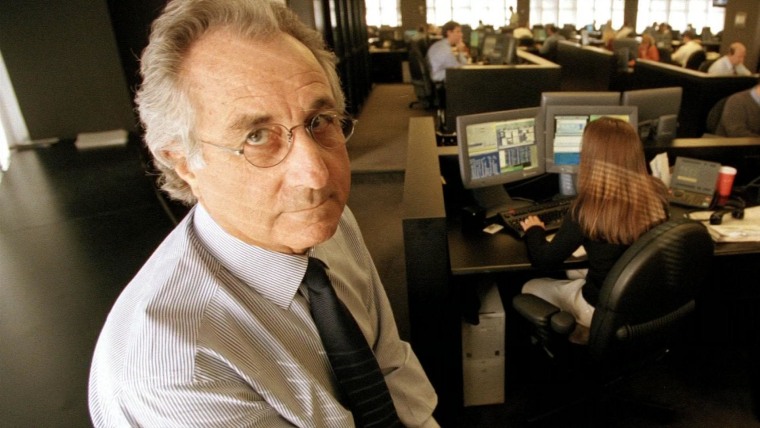Bernie Madoff’s legacy as one of Wall Street’s most notorious Ponzi schemers will outlive him — and the lessons regulators learned have implications for policymakers today.
The collapse of Madoff’s business, along with the discovery that he had been undertaking a $65 billion fleecing of tens of thousands of investors for at least 16 years, caused many within and outside the regulatory community to question how this could have taken place right under the noses of the Securities and Exchange Commission.
“The Bernie Madoff scandal was one of the biggest black eyes the SEC ever received,” said James Cox, a law professor at Duke University. “The incident brought about a huge culture change at the SEC in terms of its inspection processes,” he said. “They needed to show a lot more skepticism.”
No major new legislation or rulemaking took place after the scam was discovered, but it prompted introspection among the nation’s securities regulators to figure out how Madoff got away with such a huge crime, and for so long. The SEC published a list of the reforms it undertook in the wake of the scheme’s discovery: Improving internal controls, enhancing auditing procedures, increasing resources for investigation, and investing in more staff and more specialized training.
John Coffee, a professor at Columbia University’s Law School, said that although the scandal prompted the SEC to prioritize the investigation of Ponzi schemes, less has been done to mitigate the broader landscape of risk investors face. “The next crisis always comes from the blind side, and the key fact is that the SEC’s enforcement budget has not grown in proportion to the size and growth of the market,” he said.
“If they did nothing else, those events should have put an end to the idea that wealth is a reliable predictor of financial sophistication.”
“There are a lot of lessons that should have been learned from the Madoff Ponzi scheme, some of which may have been learned better than others,” said Barbara Roper, investor protection director for the Consumer Federation of America.
Roper said the scandal was a cautionary tale for both regulators and investors not to suspend their skepticism. “They can’t let someone’s, or some institution’s, stellar reputation cause them to drop their guard,” she said, pointing out that many of Madoff’s victims were experienced market players. “If they did nothing else, those events should have put an end to the idea that wealth is a reliable predictor of financial sophistication,” she said.
Richard Painter, a professor of corporate law at the University of Minnesota and former White House chief ethics lawyer, blamed the concept of “affinity fraud,” a con man’s tactic of ingratiating himself with a particular demographic or community in order to gain their trust. “It’s classic fraud… it takes advantage of people’s similar religious perspective or cultural identity to get their guard down,” he said. “I believe the problem was enforcement. We didn’t need any new rules in order to prevent Bernie Madoff from happening. We needed to enforce the old rules,” Painter said. But funding was tight, and Madoff was famous.
“It reminds us — if it’s too good to be true, it probably is,” said Charles Elson, director of the Weinberg Center for Corporate Governance at the University of Delaware. “People were suspending their disbelief on the force of his reputation and personality,” he said.
Painter blamed a paltry enforcement budget and a lack of financial, technological and human resources dedicated to running down leads and investigating cases of suspected fraud — a problem he said got worse under the last president. “In the Trump years, there was enormous hostility to financial regulation,” Painter said. “The antipathy you get to regulation you see in the financial community — you see that with former President Donald Trump.”
Roper said she was optimistic that President Joe Biden’s administration and Gary Gensler, the former Commodities Futures Trading Commission head Biden picked to run the SEC, will work to strengthen financial regulation and commit to funding enforcement at the level it should be.
“I’m optimistic that we will see a renewed toughness in the SEC’s approach to oversight and enforcement now Gary Gensler is confirmed as chairman,” she said. “We still haven’t taken effective steps to address the very real shortcomings in our oversight of investment advisers.”
While there might not appear to be much connection between Bernie Madoff’s crime and the calls Gensler is already facing from progressives to create a reporting and disclosure framework for diversity and environmental programs, Painter said a focus on increasing diversity within corporate America as well as within regulatory agencies themselves could break the cycle of groupthink that criminals like Madoff can exploit.
Diversity, Painter said, means a wider variety of perspectives and experiences, and fewer ingrained assumptions — which can serve as a counterbalance to complacency. “It helps overcome this affinity fraud problem,” he said.
Source: | This article originally belongs to Nbcnews.com










